We’ve all heard the strains of this tune somewhere – social media, in recent books, in our college history departments. All you need to do, in many spaces, is mention the Texas Revolution, the Alamo Defenders or Goliad, and the triggered band strikes up.
Loud and proud come the forceful march of the familiar notes: “The Texians revolted to protect slavery,” or a variation on that theme – “How can you call them heroes? They owned SLAAAAAVES!”
You respond calmly, with facts, but the band plays on. It doesn’t play better, but it does play louder and builds to its crescendo – the inevitable meltdown in which your character is called into question for merely stating facts in a calm manner. Those offering a strictly emotional appeal are meltdown-bound.
I was doing some research over Easter Weekend and happened upon the 1836 equivalent of a 2022 Facebook debate. It was uncanny. Two men sparring over current events, from behind the veil of anonymity. It reminded me so much of what I encounter almost daily, I thought some of you would appreciate seeing this 1836 debate in 21st century format.
It all began in the March 15, 1836 issue of the Pittsburg Gazette. A Texian, writing over the pen name “Curtius,” submitted to the editors a letter aimed at dispelling the myths swirling in the eastern press about Texas. The paper ran it in a series over the course of 5 days. The Gazette was an abolitionist newspaper and abolitionists were anti-Texas, so credit is due the Gazette for running the letter of a Texian at all.
Here’s what their words look like in our world…if Curtius gets a little long-winded for your taste, you can scroll on down. He says, in brief: I’ve been in Texas ten years, so I know what I’m talking about. The eastern newspapers are full of misinformation. No, the Texian leadership isn’t at odds with one another. No Santa Anna isn’t marching around with 10k troops, backed up by 15k Indians. No, Mexico has never offered Texas protection or assistance.
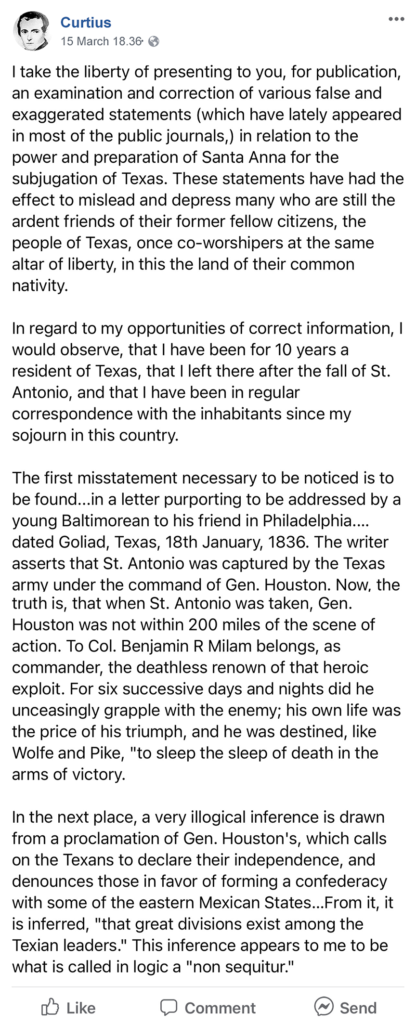
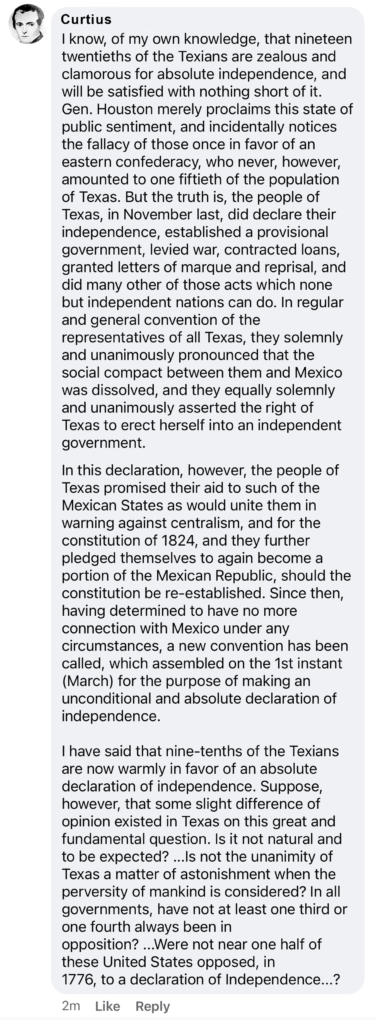
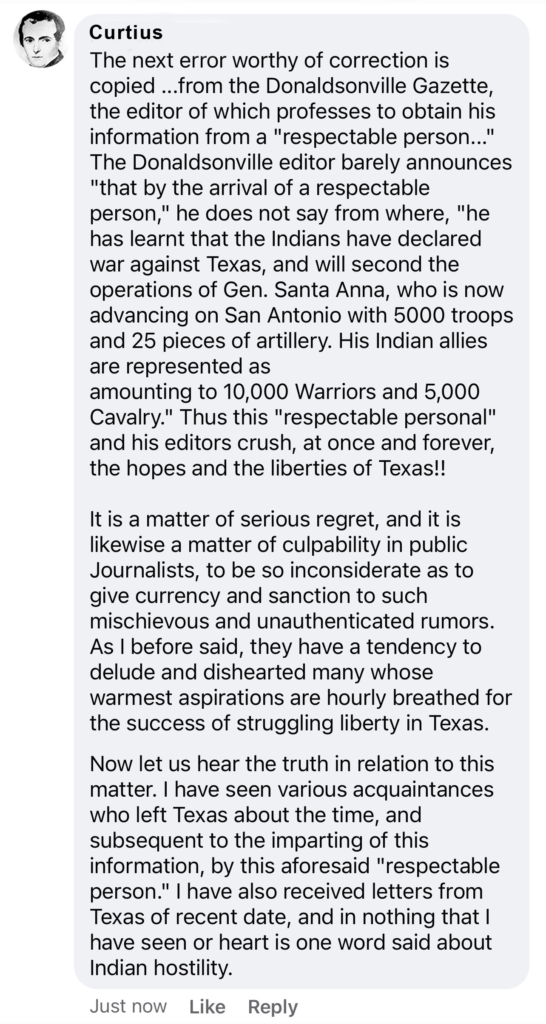
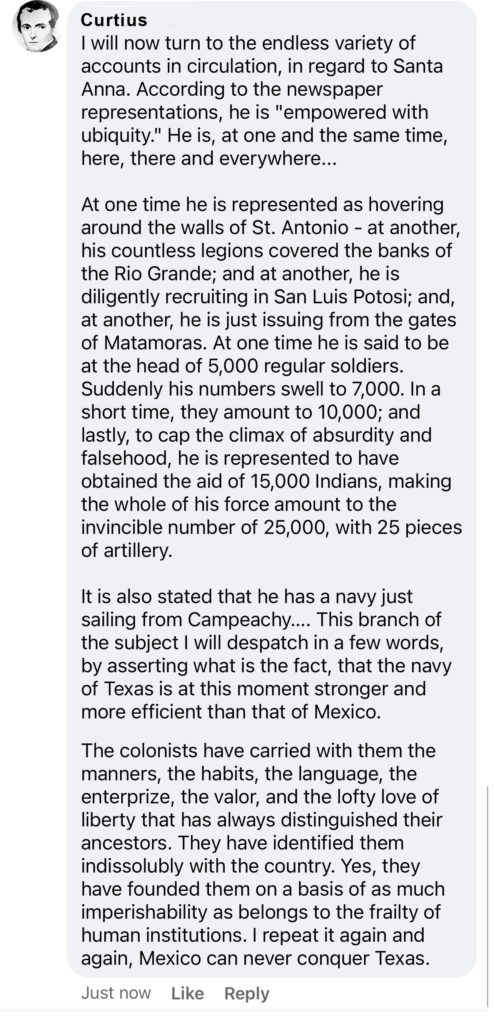
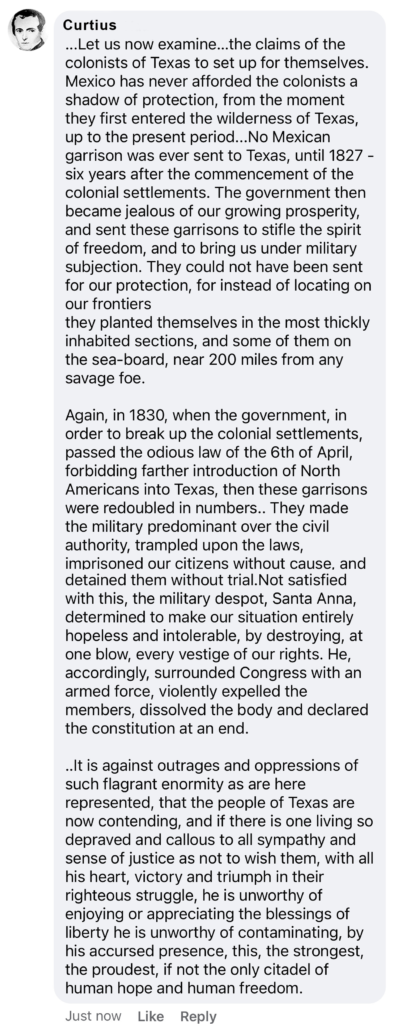
Curtius got it all off his chest. Other newspapers, he hoped, would copy the story from the Pittsburgh Gazette and perhaps their readers would have a better understanding of what was going on between Texas and Mexico…a world away, in 1836, from Pennsylvania and the northeast.
While Texans have never been much concerned with what the world thinks of us, the U. S. Congress was debating whether they should recognize the independence of Texas or have sympathy for her cause. Then, as now, popular sentiment was driven by the media. So Curtius was attempting to steer public opinion by pointing out that the story was being told wrong. Curtius posted his information in the 1836 equivalent of a Facebook group, hoping for shares.
Then, just as now, someone parachuted in with “Oh, hello there. I have a few questions about your viewpoint.” They all seem innocent enough at first, these folks with questions. There’s always that one guy under every single Facebook post. He’s contrarian but uninteresting because he repeats himself. A lot. The man writing over the signature of “Q” posed his questions to Curtius….
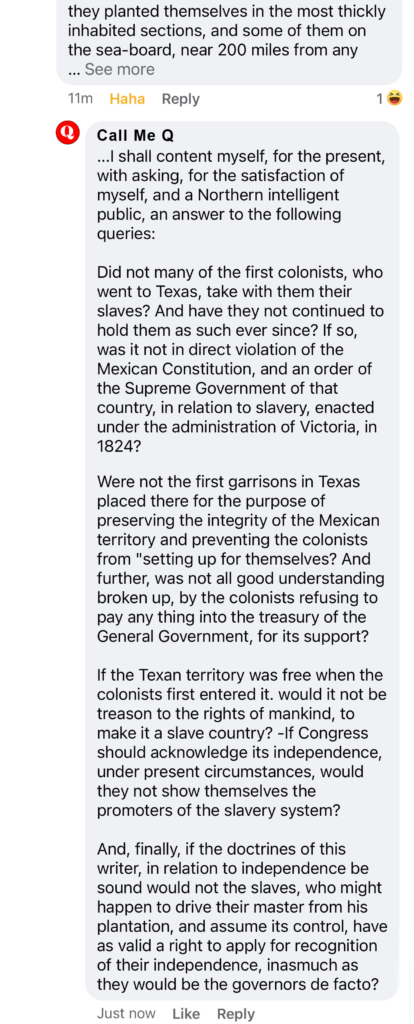
So it begins….Social media veterans will recognize the set up here and know exactly where this is headed. Q wants to see if he can draw Curtius out. No agenda to see here, readers. Just a man innocently seeking clarification about important current events. Sure, it’s mostly about slavery, but Q isn’t fixated on that, right? His logic seems a little flawed, but most of us would give him the benefit of the doubt.
Curtius provides his answers, reminding Q, in our parlance, “You’re the one who brought up slavery. Literally nobody in Texas and Mexico are arguing about this. Dude, are you 12?”
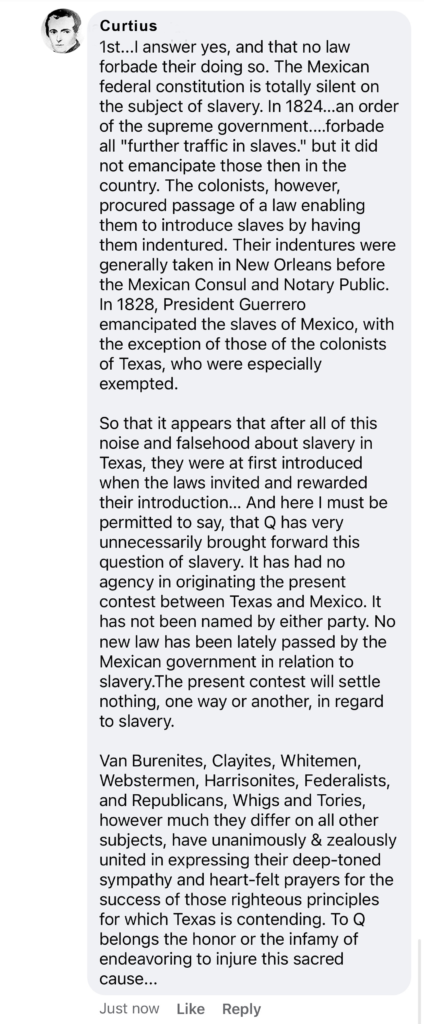
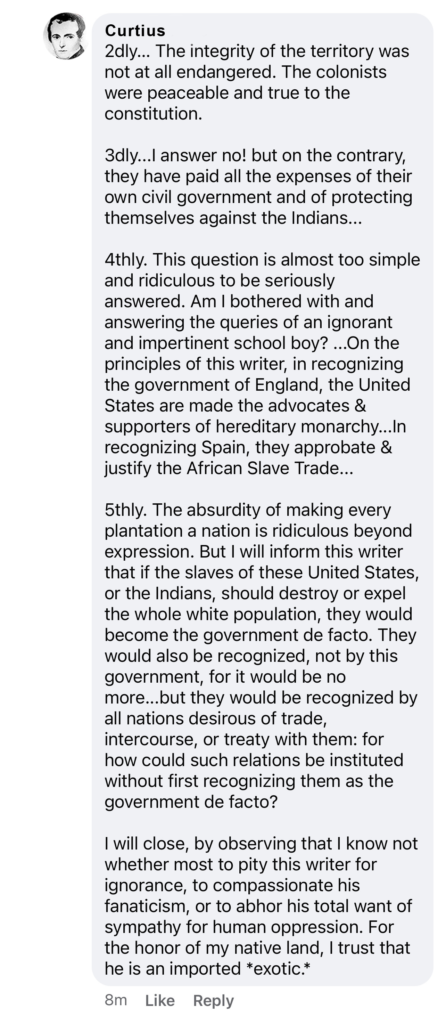
Translating:
1) Yep. Some Texians have slaves. It was legal when they entered Texas and it’s legal now. But the war with Mexico doesn’t involve slavery anyway. People of every political stripe are sympathetic to Texas except yours, Q.
2) Garrisons weren’t set up in 1827 to prevent Texans from breaking away. They were brought in to check American immigration. Duh
3) Now you accuse Texas of not paying into the Mexican treasury. Man, you’re desperately critical of a situation you know little about. Texas was paying for her own governance and protection, and had been promised exemptions from taxes.
4) You asked: “If the U.S. recognizes Texas independence, isn’t that an endorsement of slavery?” Are you high? Does the U.S. recognizing England mean they endorse monarchy? Does the U.S. recognizing Spain mean they endorse the global slave trade?
5) So you think Texas declaring independence is the equivalent of slaves taking over a plantation and declaring themselves free? You must be on some high-grade laudanum if you think that equivalency makes sense. A plantation is not a nation. But sure, if slaves overran the government of the United States, any nation who wanted to trade or make treaties with them would have to recognize them as the de facto government. You ain’t right in your head, man.
Then it happened…just as we see today in newspaper editorials, online forums, social media, classrooms and in print: Q loses his everloving mind.
The agenda behind his questions of “clarification” is revealed and his emotional appeal is vomited onto the page. They were “gotcha” questions all along, and when Curtius didn’t fall in line, things boiled over. “IT’S ALL ABOUT SLAVERY AND SLAVERY IS BAAAAAAAAAD! EXCEPT OTHER FORMS OF SLAVERY WHICH ARE NOT AS BAD AND YOU’RE THE WORST BECAUSE YOU’RE A MOUTHBREATHING SOUTHERNER. HOW DARE YOU DO NOT AGREE WITH MEEEEE?!?!?!”
(The tirade is shown as 4 long Facebook rants here to put Q into our 21st century version of the Gazette. In 1836, several days passed between the first letter and the second. Today it would be a few hours. You know how it goes…they respond to you, and then they seethe for a few hours, come back and write more, seethe, write, seethe, write.)

Ah yes! The “I have not read the original document but I know what’s in it because some other guy said a thing” tactic. A staple even today when we have access to all information all the time.
He sprinkles in a dash of “You cited an incorrect date, so you must be a liar!” to which is appended, “Guerrero couldn’t have exempted Texas because he was at least half black.”
And then a reference to the Fredonian Rebellion, in a sneering tone, aimed at putting readers on notice that the colonists of Texas were treasonous from the get-go. His source (I’ve checked it) doesn’t give any details beyond what he quotes here, so he’s not to be faulted for not knowing the magnitude of the Edwards affair or the role of colonists in putting it down.
A few days later, Q is back in the pages of the Gazette, really letting his hair down.
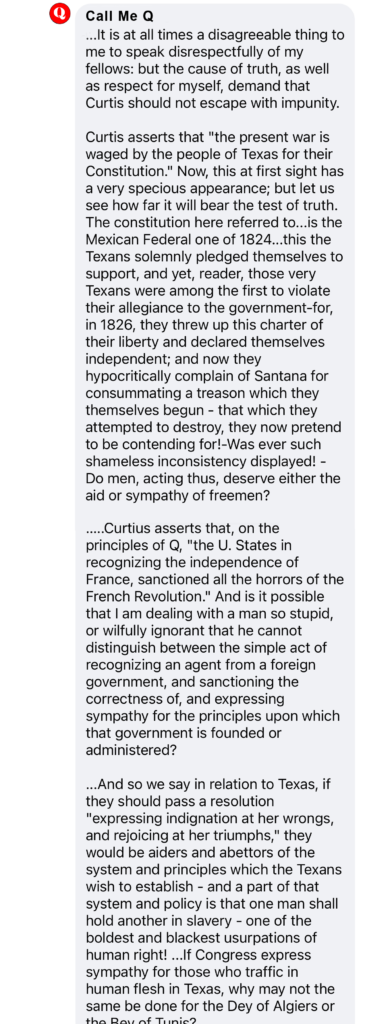
You’ll recall that it was Q who said if the U. S. recognizes Texas independence, they’d show themselves as supporters of slavery. Curtius called B.S. and asked, rhetorically, if that means the U.S. supports England’s monarchy or Spain’s activity in the slave trade by recognizing them?
Q responds by calling Curtius too stupid to distinguish between recognizing a foreign government and sanctioning the principles upon which it was founded…UNLESS slavery is involved.Don’t even try to work it all out. The logic isn’t flawed…it’s wholly absent.
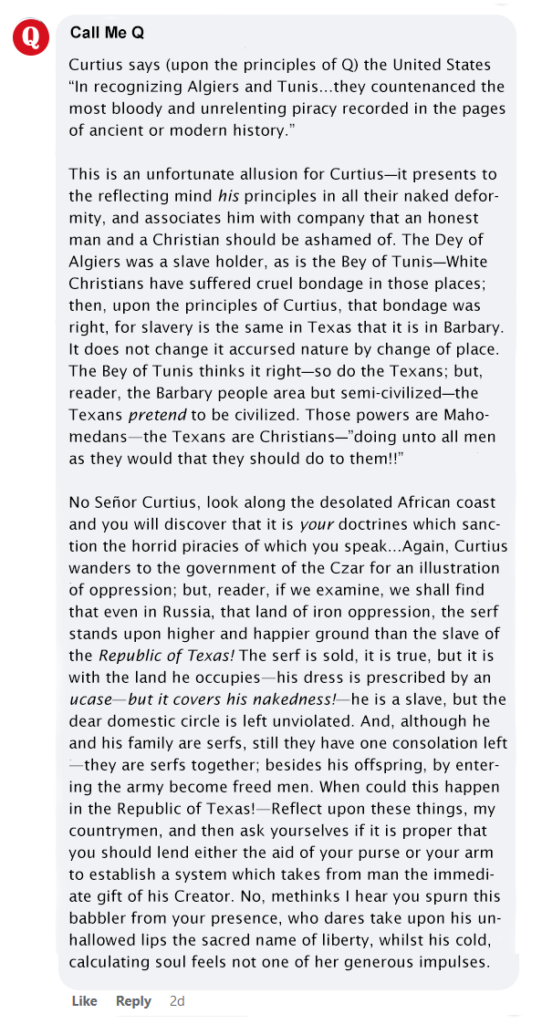
Much like his 21st century fellow-travelers who refuse to acknowledge Mexican peonage as slavery by another name, Q says sure, Russian serfs were slaves but it was better than slavery in Texas because families weren’t broken up. Serfs could serve in the army in exchange for their freedom, says Q. (Russian serf families held mock funerals for sons drafted by the Imperial Army. It was service for life and it broke up families.)
And here he criticizes Texans as pretending to be civilized. They were of Christian lineage, you see…not those heathen Muslims who don’t know any better. His hatred really shines through here. But the grand finale is yet to come….take it away, Q!
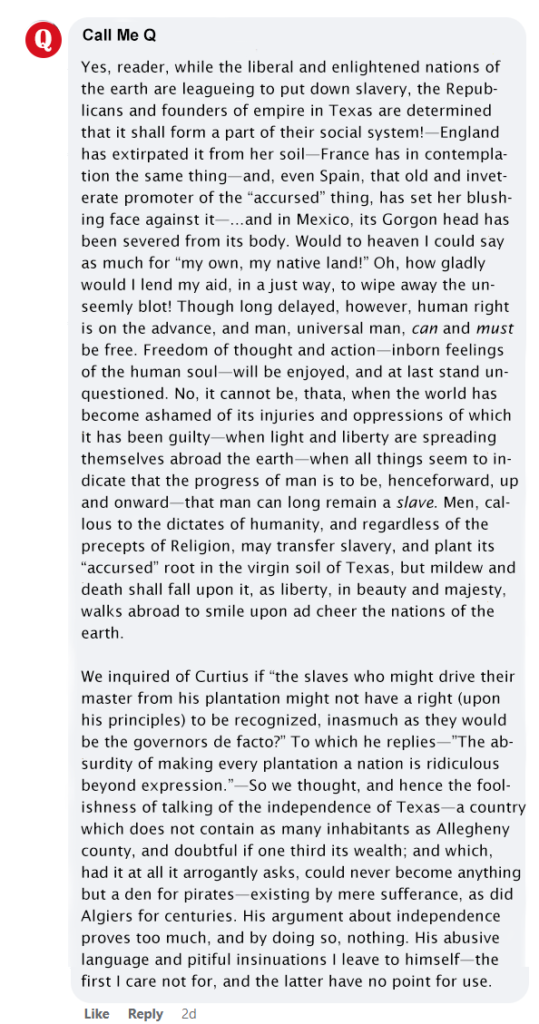
In this final flourish, Q demonstrates that he thinks the slavery monster has been decapitated in Mexico (it hadn’t,) calls the Republic of Texas a plantation, diminishes her population and wealth by comparing it to Allegheny County…then calls Curtius abusive and pitiful. Pot, meet Kettle.
Then Q storms off in a self-righteous huff. The only variance from 21st century dialogue on social media is that Q can’t block Curtius, then brag about it to his friends.
You may wonder, “Who are these two men who got into a 19th century flame war over Texas?” I can answer half of that with some certainty and the other half with a guess.
Curtius likely didn’t respond to Q’s final volley because he was on the move at the time. The man writing under the name “Curtius” was William H. Wharton, a Founding Father known around the Republic for his fiery oratory skills and pro-independence bent. He was a delegate at the Convention of ’32 and drafted the petition for separate statehood, president at the convention of ’33, delegate at the Consultation of ’35, fought at the Siege of Bexar, then was appointed commissioner to the United States. It was during his tenure in the U. S. that he wrote to the Gazette. In a letter of February 7, 1836 to Governor Henry Smith, Wharton references a pamphlet he had written under the name “Curtius” and sent to the General Council. The style of writing is very Whartonian.
The man writing as Q, I think, was Neville B. Craig, editor and owner of the Pittsburgh Gazette at the time. He was known for his scathing rebukes of other local newspaper editors and for his abolitionist views. After the Curtius letter and Q’s screed ran, the Gazette’s editorial opinion was that Q was the victor in this battle of wits, words and morals. The styles of Q and of Craig have their similarities but I can’t say with 100% certainty that Q and Craig were the same man. The brand of Texas-hatred popularized by John Quincy Adams is present in Q.
So the next time a book is released to much fanfare because it condemns the Texas Revolution as a fight for slavery, just remember that those emotional appeals are older than the Republic. Those who employ it haven’t come up with a new argument in 186 years and they never will. The format may change, but the song remains the same.
Categories: Texas Academia, Texas Culture, Texas history, Texas Revolution, The Alamo
